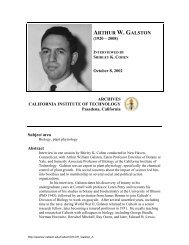Interview with Thomas A. Tombrello - Caltech Oral Histories
Interview with Thomas A. Tombrello - Caltech Oral Histories
Interview with Thomas A. Tombrello - Caltech Oral Histories
You also want an ePaper? Increase the reach of your titles
YUMPU automatically turns print PDFs into web optimized ePapers that Google loves.
<strong>Tombrello</strong>–191<br />
TOMBRELLO: I know. I’ve noticed that, and I wish them well. Because it would be a good thing<br />
if they were not just parroting the line of the Likud Party, which I feel very uneasy about. That<br />
does not automatically make me a fan of Labor, but I would like to see [Israeli Opposition<br />
Leader Tzipporah] Tzipi Livni move forward. I would like to see her run Israel, just to see what<br />
will happen. Seems like an interesting lady. Once she’s in, I might not like what she does. If I<br />
were in that country, I might well be doing exactly what they’re doing, and I try to temper what I<br />
say. But what they’re doing is not necessarily in the interests of the rest of the world. But then<br />
again, let’s not talk about the Muslim countries, because then I really get concerned: what Iran is<br />
doing; what Iraq was doing. The country I worry about the most of all in the whole world is<br />
Pakistan, and I have worried about them for more than two decades. They have been taking<br />
nuclear weapons technology that they were given by the Chinese and selling them on the street to<br />
all concerned. And this has been going on for a long time. They traded nuclear weapons<br />
technology to North Korea for rocket technology that the Koreans had developed. They were<br />
basically selling to Libya, Iraq, Iran. You name it, they were doing it, and while they may want<br />
to blame it all on Mr. Khan [Pakistani nuclear scientist Abdul Qadeer Khan], I think it was<br />
government policy in Pakistan and may continue to be.<br />
Pakistan is the most dangerous country in the world. I’ve said this for many, many years.<br />
There are countries that are, you know, quiescent now. When the ANC [African National<br />
Congress] took over in South Africa, the previous government destroyed the nuclear weapons<br />
they had, and they destroyed the capability of building them, but they did not destroy the ability<br />
to process U-235, nor did they get rid of the fact they have a lot of U-235 that’s perfectly decent<br />
material to make weapons out of. So you might say there is a sleeping giant in the nuclear<br />
business in South Africa. Libya got out of the game as a trade for something else—Lockerbie, I<br />
don’t know.<br />
ASPATURIAN: Maybe Qaddafi just got tired of it.<br />
TOMBRELLO: Or help from the West in producing oil. The whole thing is quite unstable and has<br />
gotten more so. I remember writing a position paper at Livermore—I guess some of it is<br />
classified, but the most of it certainly is not. [Francis] Fukuyama was talking about the end of<br />
history, and my opinion, back at that point in time, was that it was not that way. The Soviet<br />
http://resolver.caltech.edu/<strong>Caltech</strong>OH:OH_<strong>Tombrello</strong>_T

















